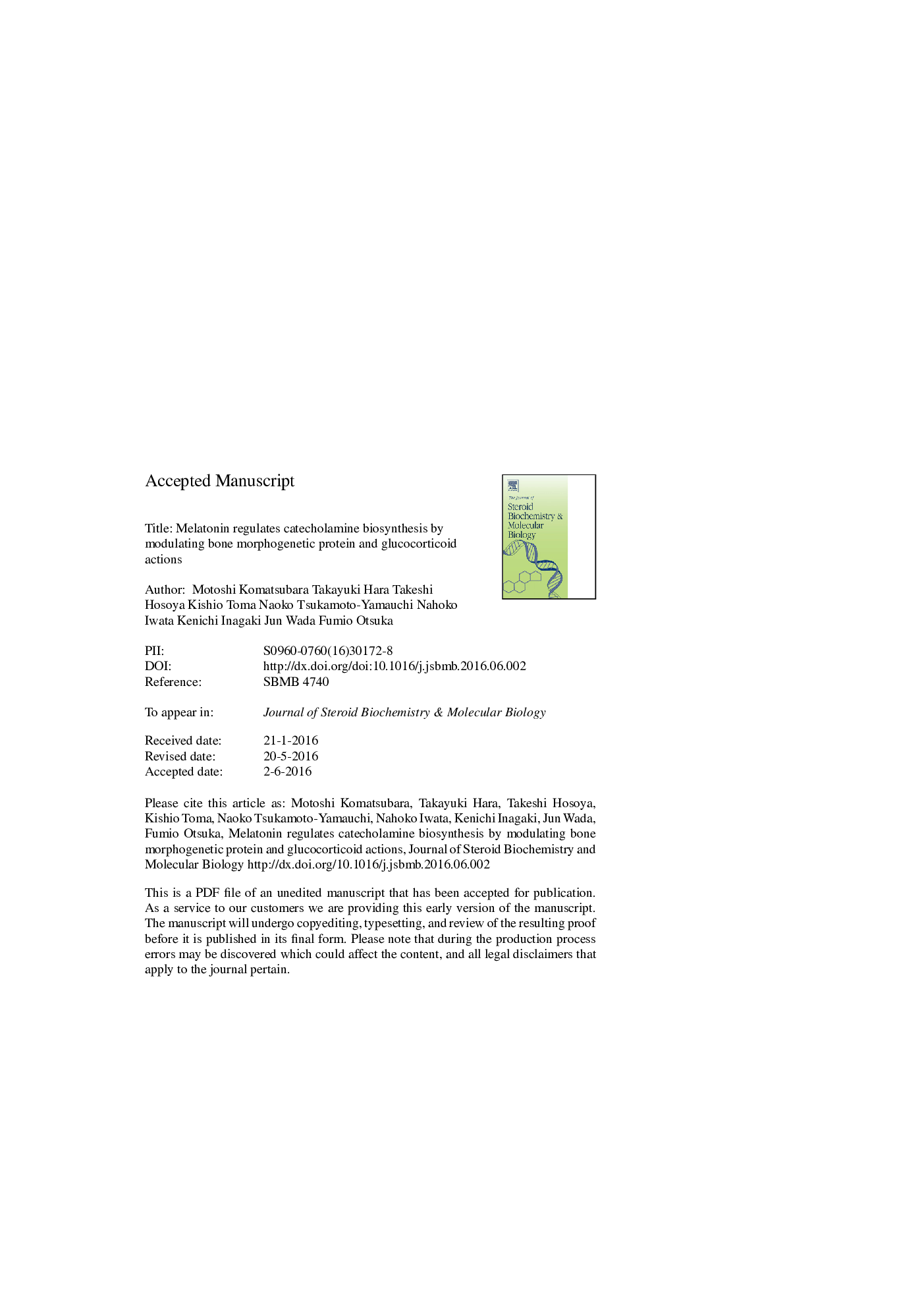| کد مقاله | کد نشریه | سال انتشار | مقاله انگلیسی | نسخه تمام متن |
|---|---|---|---|---|
| 5513130 | 1540982 | 2017 | 43 صفحه PDF | دانلود رایگان |
عنوان انگلیسی مقاله ISI
Melatonin regulates catecholamine biosynthesis by modulating bone morphogenetic protein and glucocorticoid actions
ترجمه فارسی عنوان
ملاتونین بیوسنتز کاتچولامین را با تعدیل پروتئین های مورفوژنیک استخوان و اقدامات گلوکوکورتیکوئید تنظیم می کند
دانلود مقاله + سفارش ترجمه
دانلود مقاله ISI انگلیسی
رایگان برای ایرانیان
کلمات کلیدی
DHTBMP type-II receptorBMP type-I receptorBMPRIActRIIactivin type-I receptorPNMTPC12TGFBMPRIIdopamine-β-hydroxylasepKaDBHddC - DDCALK - آلکActRI - بازیگر نقش اول زنtransforming growth factor - تبدیل فاکتور رشدtyrosine hydroxylase - تیروزین هیدروکسیلازDihydrotestosterone - دی هیدروتستوسترونPheochromocytoma - فئوکروموسیتومBMP - مدیریت فرایند کسب و کارMelatonin - ملاتونینBone morphogenetic protein - پروتئین مورفوژنیک استخوانprotein kinase A - پروتئین کیناز Acatecholamine - کاتکولآمینهاactivin receptor-like kinase - کیناز گیرنده مانند فعال استGlucocorticoid - گلوکوکورتیکوئیدهاAndrogen Receptor - گیرنده آندروژنیMelatonin receptor - گیرنده ملاتونینMineralocorticoid receptor - گیرنده مینرالوکورتیکوئید glucocorticoid receptor - گیرنده گلوکوکورتیکوئید
موضوعات مرتبط
علوم زیستی و بیوفناوری
بیوشیمی، ژنتیک و زیست شناسی مولکولی
زیست شیمی
چکیده انگلیسی
Melatonin is functionally involved in the control of circadian rhythm and hormonal secretion. In the present study, we investigated the roles of melatonin in the interaction of catecholamine synthesis with adrenocortical steroids by focusing on bone morphogenetic protein (BMP)-4 expressed in the adrenal medulla using rat pheochromocytoma PC12 cells. Melatonin treatment significantly reduced the mRNA expression of catecholamine synthases, including the rate-limiting enzyme tyrosine hydroxylase (Th), 3,4-dihydroxyphenylalanine decarboxylase and dopamine-β-hydroxylase expressed in PC12 cells. In accordance with changes in the expression levels of enzymes, dopamine production and cAMP synthesis determined in the culture medium and cell lysate were also suppressed by melatonin. The MT1 receptor, but not the MT2 receptor, was expressed in PC12 cells, and luzindole treatment reversed the inhibitory effect of melatonin on Th expression, suggesting that MT1 is a functional receptor for the control of catecholamine synthesis. Interestingly, melatonin enhanced the inhibitory effect of BMP-4 on Th mRNA expression in PC12 cells. Melatonin treatment accelerated BMP-4-induced phosphorylation of SMAD1/5/8 and transcription of the BMP target gene Id1. Of note, melatonin significantly upregulated Alk2 and Bmpr2 mRNA levels but suppressed inhibitory Smad6/7 expression, leading to the enhancement of SMAD1/5/8 signaling in PC12 cells, while BMP-4 did not affect Mt1 expression. Regarding the interaction with adrenocortical steroids, melatonin preferentially enhanced glucocorticoid-induced Th mRNA through upregulation of the glucocorticoid receptor and downregulation of Bmp4 expression, whereas melatonin repressed Th mRNA expression induced by aldosterone or androgen without affecting expression levels of the receptors for mineralocorticoid and androgen. Collectively, the results indicate that melatonin plays a modulatory role in catecholamine synthesis by cooperating with BMP-4 and glucocorticoid in the adrenal medulla.
ناشر
Database: Elsevier - ScienceDirect (ساینس دایرکت)
Journal: The Journal of Steroid Biochemistry and Molecular Biology - Volume 165, Part B, January 2017, Pages 182-189
Journal: The Journal of Steroid Biochemistry and Molecular Biology - Volume 165, Part B, January 2017, Pages 182-189
نویسندگان
Motoshi Komatsubara, Takayuki Hara, Takeshi Hosoya, Kishio Toma, Naoko Tsukamoto-Yamauchi, Nahoko Iwata, Kenichi Inagaki, Jun Wada, Fumio Otsuka,
